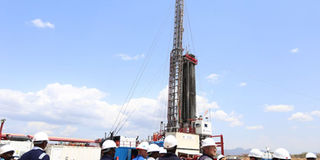Haphazard levies do not augur well for growth of our nascent mining industry

Tullow Oil's Ngamia 3 oil exploration site in Nakukulas Village in Turkana County on July 13, 2014. Tullow has announced it expects to produce oil for the first time in Kenya by 2020. PHOTO | BILLY MUTAI |
What you need to know:
- To attract more investment in its nascent mining sector, Kenya should strive to make the experience for investors as streamlined and hassle-free as possible.
- Friction between county governments and the national government on allocation of funds threatens to create a situation that will impede the growth of any industry.
Mining, by its very nature, is capital-intensive, risky, and involves long time frames before a profit is realised.
Because of this, it requires a guaranteed level of long-term financial stability and legal certainty. Most of the sites in Kenya that are under exploration have not yet reached the level of exploitation.
This is the reality that guides business in the extractive sector.
The Kwale County governor earlier this year attempted to issue an invoice to Base Titanium, which runs the Kwale Mineral Sands Project, for the minerals it had produced.
The Attorney-General, the Cabinet secretary for Mining, as well as the Transition Authority opposed this. The National Treasury Cabinet secretary warned the Kwale and Mombasa county governments against imposing illegal and unconstitutional taxes.
The Constitution is clear: all aspects of minerals, including rates and taxes, are within the purview of the national government and are not a devolved function.
The chairman of the Transitional Authority also recently declared the mining levies unconstitutional.
STABILITY GUARANTEED
To attract more investment in its nascent mining sector, Kenya should strive to make the experience for investors as streamlined and hassle-free as possible.
It should look to emulate Botswana, where it is clear what to expect when an investment is initiated and stability is guaranteed for the duration of the project.
The critics who complain that mining agreements (and this applies to oil and gas as well) are made between the investor and the national government, and not the county government, need to keep in mind the fact that minerals are owned by the people, all the people, and are vested in the national government.
By implication, mineral ownership does not lie with a county government or even the community where they are found — although arguably this should be where the significant benefit from mineral extraction is realised.
Currently there are too many parties seeking rent from companies trying to engage in the extractive industry. Companies in the prospecting phase are expected to come bearing goodies even before they see a cent of revenue.
Tullow Oil appears to be battling a long list of demands as it attempts to prospect for oil in Elgeyo Marakwet, for example.
SUPREMACY BATTLES
Friction between county governments and the national government on allocation of funds threatens to create a situation that will impede the growth of any industry.
Mining firms are particularly exposed when it comes to local supremacy battles. Local leaders can start a protest at any time, leading to a shutdown of operations.
This has happened to Tullow in Turkana. Such disruptions are almost impossible to predict and will end up costing the country a fortune.
Any losses miners make will not yield tax to the government or employment to the local people.
A minor disagreement at the local level could affect international shipment of products, to the detriment of the company and the country. It is easy to put a megaphone to complaints, but it is costly for an economy to manage the ensuing fallout.
The fact is that inopportune taxes can and often do render mines uneconomical. A shift in international prices is not the only thing that can shut down a mine.
Local politics can make international mineral trade unprofitable.
MINING ROYALTIES
If demands such as rents, royalties, and taxes are scheduled, competitive, and predictable, then they can be considered legitimate and can be planned for.
If, however, they are arbitrary, illegal, and sporadically introduced whenever a new regime comes in, then they become impossible to factor into the economic model of a mining project.
If the President assents to the Mining Bill 2014, 30 per cent of mining royalties will remain in the county where the minerals are found. This should negate the need for counties to levy illegal taxes on minerals.
Last year Kenya earned Sh19.7 billion from mining and more is expected as more investors are attracted to the country due to the certainty created by the passing of the Mining Bill.
The next Kwale mining project (if the niobium deal goes through) is more than a decade away. Let us not jump from one round of uncertainty to another.




